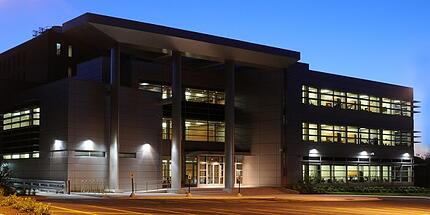In the interest of keeping at the forefront of modern bioresearch, the University of Illinois Chicago has just announced the construction of a cell regeneration research center at its College of Medicine at Rockford. If the topic of cell regeneration sounds familiar, recall that the Mayo Clinic in Rochester is also a pioneer in regenerative medicine. (You can read our blog on the subject here.) The motivation for the center began with a three million dollar grant from the CWB foundation, which supports projects that benefit disabled people. Thanks to this grant and matching university funds, UIC will be able to join the biotechnology leaders who are performing research in this quickly growing field.

(Concept art for the new center, courtesy of news.uic.edu)
For any of those who missed our most recent blog on regenerative medicine or need a quick refresher, cell regeneration is the study of making human bodies more capable of healing themselves. An example of regenerative medicine would be a spare body part grown from one’s own cells. This has the dual advantages of not requiring an organ donor plus the guarantee that the host body will accept the organ. After all, it is technically part of the host’s body.

The University of Illinois Chicago has its own innovative plans for its new research center which take regenerative medicine in an interesting new direction. Martin Lipsky, the dean of the College of Medicine, believes in application of cell regeneration to fight disease, as he explains in a WIFR article:
“For example, if your pancreas was damaged and you have diabetes, perhaps we can implant new cells that will make insulin and cure diabetes.”
What Lipsky suggests here is made possible by the ability of cell regeneration specialists to take cells from a host body and turn them into adult stem cells, that is, cells which can serve any bodily purpose. In this case, such cells could produce insulin right where it’s needed, eliminating the need for manual injections.
A current study at UIC is already working on achieving insulin independence with the use of islet transplantation. This process also reverses the progression of atherosclerosis in diabetes patients. Islet transplantation is basically the relocation of islets, clusters of cells which contain insulin producers, from donated pancreas to patient pancreas. The research is so far successful, which is excellent short term news. Imagine, though, when the donation of organs is made completely unnecessary by advances in regenerative medicine. The University of Illinois has the perfect chronological balance of a practical and applicable present combines with an exciting and innovative future.
As we previously mentioned, the construction of the cell regeneration research center at UIC is made possible by a $3 million grant from the CWB Foundation. More information on funding for the University of Illinois Chicago can be found in our specialized report:
Biotechnology Calendar, Inc. will return to the expanding University of Illinois Chicago campus to hold its annual Chicago BioResearch Product Faire™ on May 2nd, 2013. Biotechnology Calendar produces top-class life science trade shows at research universities across the nation, and has been doing so for 20 years. To participate in this year’s show, please click the button below, or see our full 2013 schedule for more opportunities.



